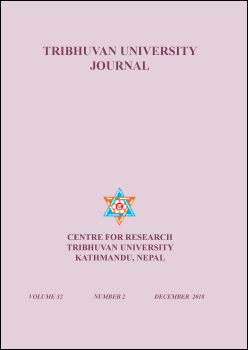The Conception of Nation in Salman Rushdie’s Midnight’s Children
DOI:
https://doi.org/10.3126/tuj.v32i2.24705Keywords:
Nation, nationality, perspectives, narration, community, empiricalAbstract
The term "nation" cannot have a general and universal definition. It is an overarching umbrella term. Salman Rushdie’s Midnight’s Children is from the beginning doubtful of the view of the modern nation. The novel presents an alternative concept of the nation, the Islamic umma. Viewed from a broader perspective, a nation is like somewhat mixed both ethno-cultural and civic category. To come up with one definition under which all nationalities fit is impossible. A nation is a large community whose members are full members simply by virtue of their mutual respect of one another as sharing characteristics that are impossible or extremely difficult to change. The narrative of the modern nation imagines the abolition of margins and the closing of gaps in the creation of a community that arises at the end of history. Besides, cutting across nation making conceptions like region, class, race, language, religion, gender and other boundaries the notion of nation establishes the idea of all-inclusiveness of all sorts of nations. A national boundary, thus, draws differences that we can find in Midnight’s Children.
Downloads
Downloads
Published
How to Cite
Issue
Section
License
This license enables reusers to distribute, remix, adapt, and build upon the material in any medium or format for noncommercial purposes only, and only so long as attribution is given to the creator.
© Center for Research, Tribhuvan University

